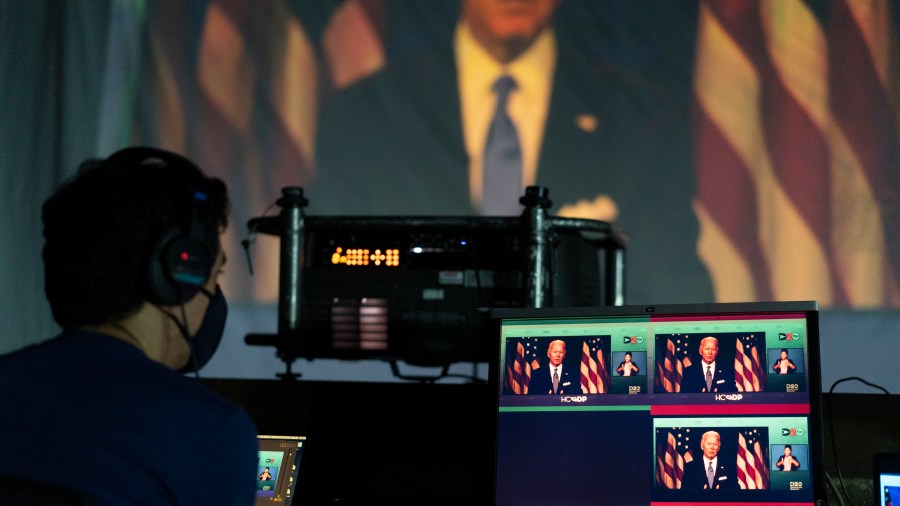Online political conventions could be a model for future conferences

The Republican National Convention starts Monday night. It’s expected to be part-virtual and part-in person. The Democratic National Convention last week was pretty much entirely virtual. It included a number of pre-produced speeches, some live elements and some long pauses and awkward transitions — but it was generally considered a success.
And since these days all kinds of conferences and conventions are going virtual — events that are big moneymakers for organizers and cities — I wondered, was the DNC a model for tech conferences in the future? I spoke with Maggie Reardon, a senior reporter for CNET. She said the Democrats pulled off a pretty good show. The following is an edited transcript of our conversation.

Maggie Reardon: It went a lot better than I was expecting. I think, though, that in a few years people will look at the DNC and cringe because they’ll be like, I can’t believe you guys did it that way. But putting it together as quickly as they did, I think they did a pretty good job. But I can definitely see that the production value could certainly be enhanced. And once you get really creative people thinking about how you can do it and make it really slick, and make those pauses a little less awkward, and figure out a way to bring the energy into the room, I think we’ll do it. One thing people were saying about this convention, too, is that the intimacy was so much more enhanced, that you really felt like the people speaking were speaking directly to people in a way they don’t when they’re on a big stage. I could definitely see that being something that happens in the conference world.
Molly Wood: One thing that I think is also interesting is these conferences run multiple days, the convention was multiple days. I participated in the NewFronts, which was four days of programming. Do you think we’ll start to see that compress?
Reardon: I hope so because I honestly think conferences are too long. Most of the people who go to [the Consumer Electronics Show] I would imagine are only there for the first day, or maybe the first day and a half, and then they leave — like all the bigwigs leave. I would love to see it get more compressed. And that was what was interesting about this convention is [it was] two hours a night. For me as a viewer, though, I don’t think I liked the speeches as well. I liked watching them on TV and seeing the people cheering and just the crowds looked so excited. And I thought that there was an element of that that was missing.
Wood: Since this started, is there anybody in tech who has made a good transition to a virtual event?
Reardon: I think Apple always does it right. Microsoft tried.
Wood: With which event?
Reardon: The developer conference, and I think that one went pretty well. There was some awkwardness to it, but I think everybody’s just going to get better and better at this.

Related links: More insight from Molly Wood
Here is a link to some data on the business events industry overall. In 2017, according to the trade group PCMA, the business events industry injected about $1 trillion into the global economy. Canceled conferences mean lost revenue for host cities, convention centers, local restaurants, performers and food vendors. North America accounted for $381 billion of all that spending in 2017. Not this year.
And if you want a visual representation of what’s happened to the conference industry — just in tech — and how different it is for us here in the U.S., head on over to Techmeme and click on the Events tab. Look at all the things marked Now Virtual or Canceled, then look at the ones that aren’t. Latitude 59 in Estonia and even Digital Procurement World in Amsterdam. I’m not saying it’s a good idea to go to a conference right now, and there are a lot of reasons it’s better for the environment, and virtual conferences can be more accessible and diverse, but for all the talk of how much easier it is to cover from afar and how much nicer it is to be in our pajamas at home with our kids, there is a tiny part of me that would seriously kill to go have some crappy conference snacks and coffee at Digital Procurement World.
The future of this podcast starts with you.
Every day, the “Marketplace Tech” team demystifies the digital economy with stories that explore more than just Big Tech. We’re committed to covering topics that matter to you and the world around us, diving deep into how technology intersects with climate change, inequity, and disinformation.
As part of a nonprofit newsroom, we’re counting on listeners like you to keep this public service paywall-free and available to all.
Support “Marketplace Tech” in any amount today and become a partner in our mission.












